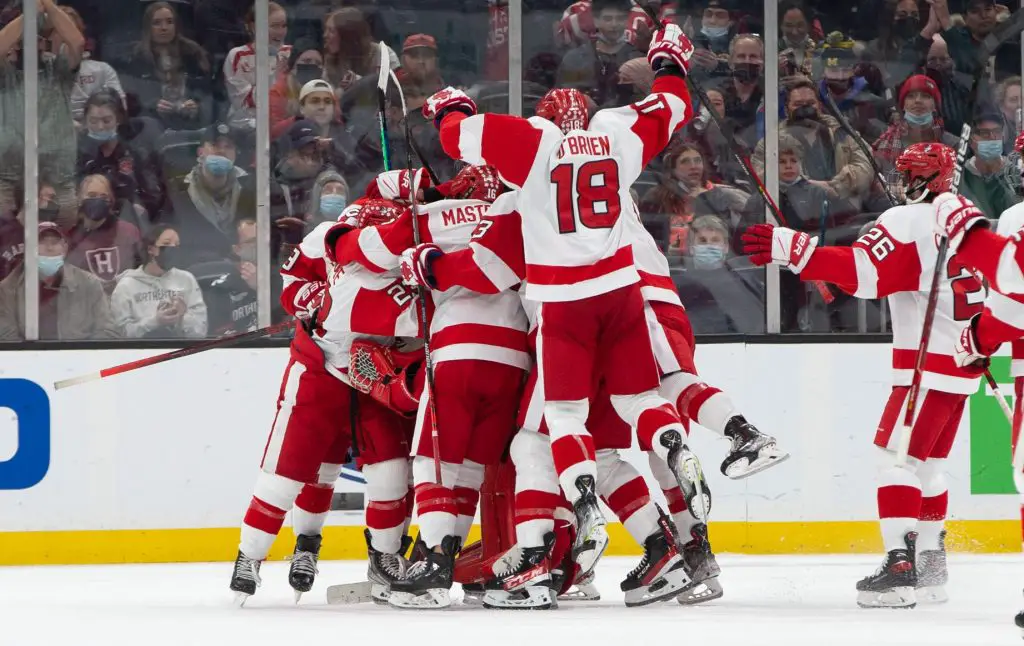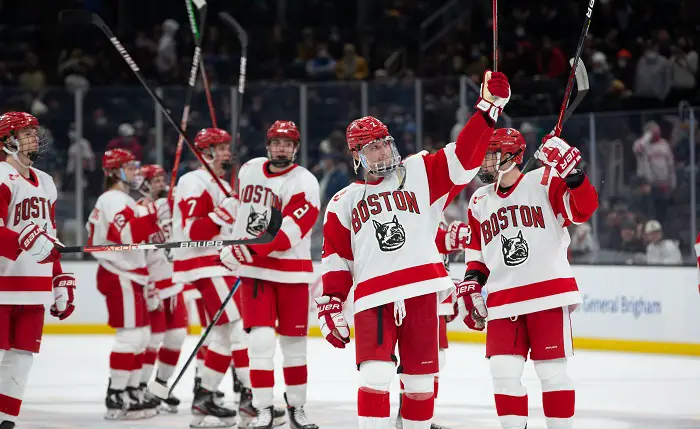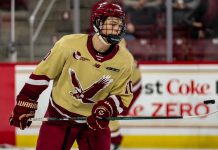
“Now is the winter of our discontent,” wrote William Shakespeare in Richard III.
What he described, this feeble writer’s mind doesn’t know, despite studying Latin and the Classics throughout a high school education at Boston Latin School, located just miles from TD Garden.
But if Shakespeare was predicting a future, one in Boston could associate the well-quoted expression with the winter of 2021.
For 68 years, the first two Mondays in February made college hockey the royal sport in Boston. Super Bowls were concluded. Trucks for Spring Training had yet to depart. But for each of the first two Mondays in Boston, the Beanpot tournament – a battle of four local-area schools in Boston College, Boston University, Harvard and Northeastern – got underway.
So when Monday, February 1, 2021, arrived, there was a great silence that wasn’t filled. The TD Garden on Causeway Street in Boston stood empty, much like it had aside from the players from local sport teams named Celtics and Bruins for much of the year.
The misery of COVID, which had raged its ugly head across the world, taking the lives of so many and interrupting the average life of everyone, had silenced the college hockey event that for 68 years – through wars, blizzards (who will forget 1978) and other world controversies – had been slowed but never stopped in its tracks. It was absent from Boston.
“It was empty,” said Steve Nazro, longtime organizer of the Beanpot for TD Garden. “You get used to doing this and it just felt empty.”
Nazro said that Monday, where the TD Garden staff also celebrated his 80th birthday, felt like a return to normalcy.
“It’s great to be back. The employees and the fans. It’s exciting. You can tell everyone really missed it.”
For the teams on the ice, the sentiment was identical.
“It was great to see the building full and back having the Beanpot,” said Boston University coach Albie O’Connell, whose Terrier square withstood a rally from Harvard to win the opening semifinal, 4-3. “The crowd was pretty lively. It was great to be back. And the pressure was real.
“It was fun, and it was nice to be on the right side of [the decision].”
Even in its return, this year’s Beanpot – the 69th edition – feels maybe like a shadow of itself. None of the four teams are battling for an NCAA spot for the first time in what seems like forever. All are missing players to the Olympics – seven in total including goaltenders Drew Commesso from Boston University and Devon Levi from Northeastern.
But the ability for fans to return to the seats of TD Garden felt cathartic – and at least a temporary reprieve from COVID – for many in attendance on Monday.

“We are all looking for the things that bring back normalcy,” said David Snow, a longtime Boston University fan who made his way to TD Garden for Monday’s games. “The Beanpot’s return is a big step in that direction. You could feel it in the stands people are just happy to be back.”
A lot has changed, believe it or not, since the last time the Beanpot landed at TD Garden. In 2020, right before COVID canceled the sports world, overtime rules were different than today. Prior to 2020, overtimes were unlimited, 20-minute periods until someone scored. During the 2020 Beanpot, the rules changed forcing teams to first play a five-minute overtime before the unlimited 20-minutes overtimes began (Boston University participated twice in overtime in that tournament).
This year’s tournament, because of NCAA rules, eliminated the extended overtimes, forcing teams to follow the protocols of a five-minute 3-on-3 overtime and then a shootout to determine the team that would advance.
When ESPN’s John Buccigross tweeted that out on Monday afternoon, it was a uniting social media moment as all four fans bases were irate.
NEWS if u weren’t aware: Beanpot will no longer have multiple OTs—treated like regular season game. If game tied after regulation, will be 3-on-3, 5-minute OT. If nobody scores, shootout determines winner/advancing team. Beanpot committee submitted waiver to NCAA but was denied pic.twitter.com/tvYMQKadpp
— House of Bucci Mane (@Buccigross) February 7, 2022
Still, once the puck dropped on the evening, it felt like hockey as usual. Sure, fans were required to show vaccine status and wear facemasks, but the ability to be back in a place that felt familiar was critical to the college hockey family that is almost accustomed to gathering for an event that, for years, was called the social event of the year in Boston.


